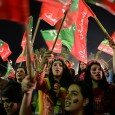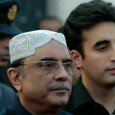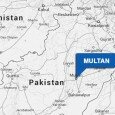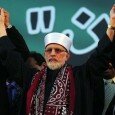By Ejaz Haider –
The elections, if they throw out the current coalition, should have a salutary effect on the next government which will have to do better
Forecasting is dicey business. It reminds me of a scene from a Punjabi slapstick. A man suddenly appears on stage and pounces on a roadside astrologer. As he beats up the astrologer, with the poor guy howling for help against this sudden assault, passersby stop and ask the offender the reason for his aggression. He says he wanted to check if the astrologer was authentic. Seeing the people’s perplexed expressions, he adds: “If he is an astrologer, he should have known that today he would be beaten up!”
And yet, the season of forecasting is upon us. The question most Pakistanis ask is what will Pakistan look like in 2013?
Let’s have facts first: Come February, the five-year term of the current government will be over. The tenures in office of the president, the prime minister, the army chief and the chief justice will also be ending in 2013. The past three years in terms of governance have been remarkably ineffective. The expectation is that something will change simply because it must.
But there is scepticism, too. Will the elections actually take place? Will the exercise be more meaningful with help from a strong Election Commission, a vibrant media and an activist judiciary? What role will the military play? Will it let the democratic transition take place or will it try to weigh in and influence the outcome through indirect means?
There are those who argue that the kinds of decisions Pakistan needs, both on the economic front as well as in the conduct of the war-on-terror, cannot be taken by a tenuously joined coalition produced by a split mandate.
They argue instead for a long-term caretaker government called forth by the Supreme Court and supported by the army. Corollary: there will be no elections in 2013. The next two years, according to this projection, will see a ‘national’ caretaker government take the decisions the country needs.
The results of the recent by-elections indicate a trend in favour of the PML-N in the Punjab. Those arguing that the army is likely, in collaboration with the SC, to go for a long-term caretaker set-up say the possibility of a PML-N win worries the army, given Mian Nawaz Sharif’s statements about clipping the army’s wings and his past record.
Hence there’s more need now than before for the army to clear the decks before going into battle, i.e., streamlining the economy and focusing on internal and external security threats.
So, what will it be?
Analyses and projections assume two factors: that the actors are rational and that there is a degree of institutional stability. Rational choice means the actors will seek to maximise their advantage. Institutional stability assumes that regardless of actor strategies, each will play within the accepted rules of the game.
Both of these two stabilising factors are largely missing in Pakistan, making it that much more difficult for analysts to project into the future. But let’s try the rational choice framework.
What would the army do if it games the scenario of putting in place a long-term caretaker government? It will have to look at two broad factors, each having its subsets. One, how well did the army fare previously in its attempts to streamline Pakistan? Two, how did the army deal with security issues?
So far as the first factor is concerned, army rule may have seen some economic growth on the back of external cash inflows, but nothing was done to address the structural problems that have, and continue to, beset the economy.
Furthermore, at the end of each military-rule episode, the country appeared more politically divided than before. In a rational choice framework, one would expect the army to realise that the political divisiveness we witness today, and which presumably is a major hurdle in the way of tough decision-making, is the misbegotten child of military rule. Finding: the way to move forward is not to stymie the democratic process but to allow it to proceed apace.
Addressing the internal security threats is another area of deep concern. Fighting terrorism and counterinsurgency require focus. They also require the support of the people. No war that is being fought among the people can be won without those people. And while our people are not much enamoured of their politicians, neither are they looking for cures that are worse than the disease.
Any strategy that is likely to frustrate the political process is also going to defeat the very purpose of stabilising the country and creating an environment conducive for pursuing policies that address the many challenges and threats.
In fact, and this is a point that shouldn’t be lost on the military, the socioeconomic and political divisiveness that marks Pakistan today is our biggest internal security threat, far worse than the Taliban whom the army is fighting and for which fight it needs the support of the people.
The situation offers a dilemma. The political process is riven by fault-lines but blocking the political process only deepens those fault-lines. Why should the military then not try for shock therapy? The problem with that approach is that the country cannot afford any more shocks; also, the political process at least promises, even if frustratingly slowly, the possibility of aggregating interests through the basic device of making compromises.
Pakistan is not peculiar in this regard. Many countries have passed through such transitions and reached the point where new actors have emerged and a mix of old and new actors have forced parties and groups to evolve norms and the rules of the game so essential for political stability even as actors vie for the resources of the state.
The competition, despite differences, unfolds within the confines of those rules. Countries have also tried consociationalism, a model of politics where groups and parties, usually antagonistic, have come together and worked on the basis of shared power.
An important point here is to appreciate that while it is important for the military to stay away from politics, this is merely a normative belief. In practice, it is equally important for political actors to deliver.
The current system in Pakistan is not suited to that for several reasons. It is not enough to say that the political process must go on. There are structural impediments to change through the process as it is currently configured.
This is why people frustratingly ask how they can get rid of faces that have consistently disappointed them. And yet, come election time they have no option but to choose from the very people who have disappointed them.
It is therefore, important to tweak the process itself to ensure that the casting of vote actually becomes a meaningful exercise and is not just used by parties to come to power and remain unaccountable.
That exercise is yet to be undertaken. Given that, if the elections happen, and I shall stick my neck out and say that they will, they won’t change much in terms of governance.
For change to come and for the governments to become more accountable, the combination of the judiciary, media and civil society groups will have to remain vigilant against excesses as well as procrastination, but more so campaign for reform of the system itself, an issue that requires separate treatment.
As I wrote earlier, simply allowing the process to go on will not beget us the substance of democracy unless the system is reformed. And reforms are not just a function of allowing a system to operate. Someone has to look at the working of a system and say, ‘Hey, some of the parts aren’t in sync with the rest. We need to do something about them’.
Such a call would show an understanding that flawed parts cannot be made to work well unless they are rectified. It’s a conscious activity and denotes an intervention into the system.”
On the plus side, we do see signs that while the different institutions within the system are competing with each other, there is also a sense that this brinkmanship must not derail the system itself. This realisation denotes a sense of shared risk. That is a healthy development and promises to deliver from its womb the norms that define not just the form but the substance of democracy.
However, there is need to expedite this process and not just rely on a slow evolution.
The year 2013 will bring the elections, unless actors decide on a framework other than rational choice. The elections, if they throw out the current coalition, should have a salutary effect on the next government which will have to do better, even if marginally, from this one.
The media and the people will have to play a watchdog role and outside-the-government experts will have to identify the areas of reform for the government to become more accountable.
Some things will change; others won’t. The trick is to keep at it.
The writer is a senior journalist and has held several editorial positions including most recently at The Friday Times. He is currently senior adviser, outreach, at the Sustainable Development Policy Institute






























































































